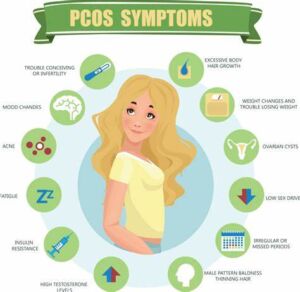
All About PCOS: Understanding, Managing, and Thriving
Polycystic Ovary Syndrome, commonly known as PCOS, is a widespread yet often misunderstood health condition that affects women of all ages adolescence to menopause.
This multifaceted condition can present a range of symptoms and challenges, from irregular periods to hormonal imbalances, and it deserves our attention.
This comprehensive article will delve into the complex world of PCOS, providing an in-depth exploration of its definition and symptoms, debunking prevailing myths, strategies for self-care and dietary hacks to help you better comprehend, manage, and thrive despite Polycystic Ovary Syndrome.
Nevertheless, it’s crucial to note that this article does not substitute professional medical advice.
If you suspect you have PCOS or require personalized guidance, please consult a healthcare provider who can offer expert advice and tailored support.
What is PCOS?:
Polycystic Ovary Syndrome, abbreviated as PCOS, is a hormonal disorder primarily affecting ovaries during their reproductive years.
This condition consists of an imbalance in reproductive hormones, particularly elevated levels of androgens (male hormones), including testosterone.
This hormonal discord can lead to symptoms and complications, encompassing irregular menstrual cycles, the formation of ovarian cysts, the emergence of acne, excessive hair growth (referred to as hirsutism), and fertility concerns.
What are some Common Symptoms of PCOS?
- Irregular Menstrual Cycles: Polycystic Ovary Syndrome can cause infrequent or prolonged menstrual periods or even lead to missed periods, which can be distressing for those affected.
- Acne: Elevated androgen levels may contribute to acne, often manifesting along the jawline and chin. The physical discomfort is increased by the impact on one’s self-esteem and mental health.
- Unwanted Hair Growth: Excess androgens can lead to hirsutism, causing increased hair growth on the face, chest, or back. This symptom can have significant emotional and psychological effects.
- Weight Gain: Individuals with PCOS encounter weight management challenges, experiencing unexplained weight gain or experiencing difficulties in losing weight. It can affect self-image and overall health.
- Ovarian Cysts: PCOS has the potential to prompt the development of small, fluid-filled cysts on the ovaries detected through imaging. The fear of potential complications can cause anxiety.
- Fertility Challenges: Irregular ovulation can render conception more challenging, posing difficulties in becoming pregnant. It can lead to stress and a sense of loss.
What are some Common Myths about PCOS?
- PCOS Only Affects the Ovaries: Contrary to popular belief, PCOS is not solely an ovarian concern. It can have widespread effects on an individual’s health, including metabolic and cardiovascular consequences. This misunderstanding can lead to inadequate care.
- All PCOS Symptoms Are Visible: While PCOS can manifest visibly with symptoms like hirsutism and acne, not all individuals with PCOS will exhibit these signs. Many struggle silently with internal issues like hormonal imbalances and menstrual irregularities.
- You Can’t Get Pregnant with PCOS: Although PCOS can complicate conception, many individuals with PCOS successfully conceive with appropriate medical support. It’s a myth that can lead to unnecessary distress.
How to Manage PCOS Symptoms?
Effectively managing PCOS requires a multifaceted approach that addresses this condition’s physical and emotional aspects. Incorporating lifestyle changes, medical treatments, and self-care strategies can help alleviate symptoms and enhance overall well-being. Here are some effective management strategies to consider:
Lifestyle Modifications: A balanced and healthy lifestyle is foundational in managing PCOS. This includes maintaining a well-balanced diet, engaging in regular physical activity, and implementing stress management techniques. These changes can help regulate hormones and alleviate symptoms.
Medications: Healthcare providers may prescribe medications to regulate menstrual cycles, control androgen levels, or enhance insulin sensitivity. It’s important to understand how these medications work and communicate openly with your healthcare provider about any side effects or concerns.
Fertility Treatments: For those concerned about fertility, healthcare professionals may recommend fertility treatments such as ovulation induction or in vitro fertilization (IVF). These treatments can be emotionally and physically demanding, so seeking support from loved ones and mental health professionals is essential.
Self-Care: Prioritizing self-care practices, including stress management, obtaining adequate sleep, and practising relaxation techniques, can significantly reduce the impact of PCOS on daily life. Self-care is not selfish; it’s necessary for overall well-being.
Nutrition and Diet Hacks:
Nutrition plays a pivotal role in managing Polycystic Ovary Syndrome. Here are some dietary recommendations to consider:
Balanced Diet: Maintain a well-balanced diet that includes lean proteins, whole grains, fruits, and vegetables. These foods provide essential nutrients that can help manage insulin resistance, a common issue in PCOS.
Low Glycemic Index (GI) Foods: These foods can help stabilize blood sugar levels, which can be particularly beneficial for individuals with PCOS. Examples include whole grains, legumes, and nonstarchy vegetables.
Healthy Fats: Incorporate sources of healthy fats such as avocados, nuts, and fatty fish into your diet. These fats are essential for hormone production and overall health.
Limit Processed Foods: Decrease your consumption of highly processed and sugary foods. These can lead to blood sugar spikes and exacerbate symptoms.
Regular Meals: Consume well-balanced meals to prevent blood sugar spikes and maintain energy levels. Skipping meals or going too long without eating can worsen insulin resistance.
Conclusion:
Polycystic Ovary Syndrome is a multifaceted condition that can impact various aspects of an individual’s life. Understanding common symptoms, dispelling prevalent myths, and implementing effective management strategies can significantly enhance the quality of life for those with PCOS. However, it’s paramount to emphasize that this article is not a substitute for professional medical advice. Suppose you suspect you have PCOS or require guidance on managing this condition. In that case, it is imperative to consult a healthcare provider who can offer expert advice and personalized support tailored to your unique needs and circumstances. Remember, knowledge and support can help you navigate PCOS and live a fulfilling life.

